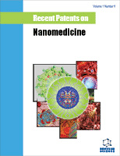Abstract
Platinum nanoparticles (nano-Pts) scavenge superoxides and peroxides indicating that they can act as superoxide dismutase (SOD)/catalase mimetics. This could be useful for protection against and/or amelioration of oxidative stress-associated pathologies. Recent studies investigated the effects of poly acrylic acid-capped nano-Pts on hyperthermia (HT) and ultraviolet (UV)-induced apoptosis and the underlying molecular mechanisms in human lymphoma cells and keratinocytes, respectively. The reports showed that nano-Pts resulted in HT-desensitization in lymphoma cells where the signaling pathways involved in apoptosis were inhibited by nano-Pts. On the other hand, nano- Pts effectively protected against UV-induced inflammation in keratinocytes by decreasing reactive oxygen species (ROS) production and inhibiting apoptosis. This chapter reviews the latest findings on the effects of nano-Pts on HT- and UVinduced apoptosis and also discusses some recent patents related to this field.
Keywords: platinum nanoparticles, heat, ultraviolet, apoptosis, ROS, inflammation, catalase mimetics, hyperthermia, human lymphoma cells, UV-induced inflammation, Nanotechnology, pulmonary inflammation, tumor tissues, heat shock treatment, cytochrome
 3
3

